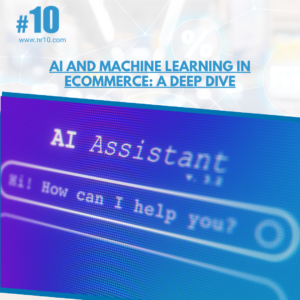AI and Machine Learning in eCommerce: A Deep Dive
Q1: What are the key benefits of integrating AI in eCommerce platforms?
Q2: How do machine learning algorithms process customer data for better insights?
Q3: How can AI-driven chatbots transform the eCommerce customer experience?
Q4: What role does AI play in predicting eCommerce sales trends?
Q5: How does AI optimize pricing strategies in eCommerce?
Q6: What are the latest advancements in AI for improving search functionality in eCommerce sites?
Q7: How is AI used to improve the personalization of customer experiences in eCommerce?
Q8: What impact does AI have on supply chain management in eCommerce?
Q9: How does AI enhance customer retention strategies in eCommerce?
Q10: What role does AI play in optimizing the check-out process for eCommerce stores?
What are the key benefits of integrating AI in eCommerce platforms?
With the dawn of digitization, online shopping has become the new norm. Incorporating AI into eCommerce platforms has revolutionized the way merchants interact with their customers.
- Personalization: AI algorithms analyze browsing habits, purchase histories, and user behaviors to display personalized product recommendations.
- Chatbots and Virtual Assistants: Through natural language processing, AI-powered chatbots help in addressing customer queries around the clock.
- Inventory Management: AI optimizes inventory levels by predicting demand, analyzing buying patterns, and even considering external factors like holidays or local events.
- Pricing Strategy: Dynamic pricing algorithms adjust prices in real-time, considering factors like stock levels, competitor prices, and demand patterns.
- Visual Search: Customers can now snap a picture of a desired item and find similar products online, all thanks to image recognition technologies.
- Voice Search Optimization: With devices like Alexa and Google Home becoming prevalent, optimizing for voice search is pivotal. AI helps in understanding and processing voice queries efficiently.
- Fraud Detection: Machine learning algorithms can identify potentially fraudulent activities by recognizing patterns and anomalies in transaction data.
- The enhanced user experience is a significant boon. With faster query resolutions and personalized shopping experiences, customer satisfaction levels surge.
- For marketers, the predictive analysis can forecast trends, helping them tailor their strategies.
- Lastly, the integration of AI leads to operational efficiency, automating mundane tasks and thus, driving profitability.
How do machine learning algorithms process customer data for better insights?
Machine learning (ML) offers transformative possibilities for the eCommerce sector, particularly when it comes to deciphering complex customer data.
- Data Collection: ML algorithms begin by collecting vast amounts of data from different sources – website visits, social media interactions, and purchase histories.
- Data Cleaning: Before processing, the algorithm sifts through the data, discarding anomalies and irrelevant information.
- Pattern Recognition: The core of ML is identifying patterns. For instance, it might recognize that customers who bought a particular book often also purchased a specific kind of bookmark.
- Predictive Analysis: Based on past behaviors, ML can predict future actions, like suggesting products or foreseeing stock demands.
- Customer Segmentation: ML classifies customers into distinct groups based on shared behaviors or preferences. This aids in targeted marketing campaigns.
- Sentiment Analysis: By analyzing reviews, social media mentions, and other forms of feedback, ML gauges the public sentiment around a product or brand.
- Visual Data Processing: Through image recognition, ML can categorize products, aiding in visual searches.
- Natural Language Processing (NLP): ML understands and responds to user queries in natural language, making chatbots and virtual assistants more efficient.
- Continuous Learning: Unlike traditional software, ML algorithms evolve. They continuously learn from new data, refining their insights and predictions.
- Machine learning’s ability to sift through vast datasets quickly and extract actionable insights gives eCommerce businesses a competitive edge, ensuring they respond effectively to ever-evolving customer needs.
For businesses seeking to leverage these benefits, our services provide comprehensive solutions tailored to diverse eCommerce needs.
How can AI-driven chatbots transform the eCommerce customer experience?
The potential of AI-driven chatbots in the eCommerce realm is immense. Their integration is not just a technological advancement but a strategic move to enhance the customer experience.
- 24/7 Availability: Chatbots are always available, ensuring customers receive instant responses regardless of time zones or holidays.
- Instant Query Resolution: Unlike human agents, chatbots can handle multiple queries simultaneously, offering immediate solutions.
- Personalized Recommendations: Through continuous learning, chatbots analyze user interactions and behavior to provide tailored product suggestions.
- Cost-Effective: Implementing a chatbot is more cost-efficient in the long run compared to hiring multiple customer service representatives.
- Enhanced User Engagement: Interactive chatbots with a touch of humor or personality can keep users engaged, enhancing their shopping experience.
- Order Management: Customers can inquire about their order status, initiate returns, or even place orders through chatbots.
- Feedback Collection: Chatbots can solicit feedback post-purchase, providing businesses with valuable insights for improvement.
- Multilingual Support: Advanced chatbots support multiple languages, ensuring a broader customer base can be catered to effectively.
- Integration with CRM: When integrated with Customer Relationship Management systems, chatbots can provide more detailed and personalized assistance using the customer’s purchase history and preferences.
- Upselling and Cross-Selling: Based on user behavior and past purchases, chatbots can recommend additional products, increasing sales opportunities.
Leveraging AI-driven chatbots can bridge the gap between businesses and consumers, fostering loyalty and trust. As discussed in our guide on Native Mobile App vs. Responsive Website for Magento, integrating chatbots on both platforms can significantly enhance user interaction.
What role does AI play in predicting eCommerce sales trends?
Predicting sales trends is a pivotal aspect of eCommerce, and with AI, it’s more accurate than ever.
- Data Analysis: AI processes vast datasets from various sources, identifying patterns and correlations that might be overlooked by human analysts.
- Seasonal Trend Prediction: By analyzing past sales data, AI can predict demand surges during specific periods, like holidays or sale seasons.
- Inventory Management: Predictive analytics can forecast which products will be in demand, helping businesses maintain optimal inventory levels.
- Customer Behavior Prediction: AI identifies purchasing habits, enabling businesses to anticipate what customers are likely to buy next.
- Dynamic Pricing: AI algorithms analyze market demand, competitor prices, and other factors to adjust product prices in real-time.
- Marketing Campaign Optimization: AI predicts which marketing strategies will resonate best with the target audience, ensuring better ROI.
- New Product Launch: By gauging market sentiment and analyzing competitor products, AI can predict how well a new product might be received.
- Risk Assessment: AI can forecast potential downturns or risks in sales, enabling businesses to strategize accordingly.
- Supplier and Demand Forecast: Predicting the demand for products also allows businesses to communicate future needs to suppliers effectively.
- Enhanced Customer Experience: By understanding and anticipating customer needs, businesses can tailor their offerings, leading to increased satisfaction and loyalty.
For businesses aiming to stay ahead in the competitive eCommerce landscape, integrating AI for sales predictions is a strategic move. Our comprehensive services can guide businesses in this integration, ensuring sustainable growth.
How does AI optimize pricing strategies in eCommerce?
Optimizing pricing strategies with AI is a game-changer in eCommerce, where price is a critical competitive lever.
- Dynamic Pricing: AI algorithms can adjust prices in real-time based on demand, competitor pricing, inventory levels, and market conditions.
- Price Sensitivity Analysis: AI gauges how price changes impact customer purchasing decisions, helping businesses find the optimal price point.
- Competitor Monitoring: By continuously tracking competitor prices, AI helps businesses stay competitive without engaging in a race to the bottom.
- Discount Management: AI determines the most strategic times to offer discounts and promotions, maximizing their impact.
- Customized Pricing: For B2B eCommerce, AI can tailor pricing strategies to individual customers or segments based on their value and purchasing behavior.
- Supply Chain Factors: AI considers supply chain costs, including raw materials and logistics, to ensure pricing strategies are profitable.
- Historical Data Learning: Utilizing past sales data, AI predicts future price trends and the best times to adjust pricing.
- Elasticity Modeling: By modeling price elasticity, AI predicts how changes in price will affect supply and demand.
- Integration with Marketing: AI ensures pricing strategies align with marketing campaigns for coherent brand messaging.
- Consumer Goods Pricing: For consumer goods, AI helps in setting introductory prices for new products based on predicted demand and market acceptance.
Implementing AI-driven pricing strategies can significantly enhance margins and market share. It’s vital for eCommerce businesses to embrace such technologies to remain agile in a dynamic market.
What are the latest advancements in AI for improving search functionality in eCommerce sites?
AI advancements have significantly improved search functionality on eCommerce sites, making product discovery more intuitive and efficient.
- Natural Language Processing (NLP): AI uses NLP to understand and process user queries in conversational language, improving search accuracy.
- Visual Search Capabilities: AI-powered visual search lets users upload images to find similar products, leveraging image recognition technology.
- Personalized Search Results: AI personalizes search outcomes based on user behavior, search history, and preferences.
- Voice-Activated Search: With the rise of smart speakers, AI enables voice search, making it possible to shop hands-free.
- Predictive Search: AI predicts what a customer is looking for, offering suggestions even before the entire search term is entered.
- Semantic Search: Going beyond keywords, AI understands the context and intent behind searches, providing more relevant results.
- Autocorrection and Synonyms: AI autocorrects misspelled words and recognizes synonyms, ensuring users find what they need without exact phrasing.
- Search Result Ranking: AI ranks search results not just by relevance but also by user behavior, predicting which products are more likely to convert.
- User Feedback Learning: AI systems learn from user feedback to continually improve search results.
- Augmented Reality (AR) Search: Advanced AI integrates with AR, allowing users to visualize products in their own space before buying.
Enhancing search functionality with AI not only improves the user experience but also drives conversions by helping customers find exactly what they want faster.
How is AI used to improve the personalization of customer experiences in eCommerce?
Personalization is at the core of modern eCommerce, and AI is the driving force behind creating individualized customer experiences.
- Predictive Analytics: AI analyzes past behavior to predict future actions of customers, allowing for personalized product recommendations.
- Customer Segmentation: By segmenting customers based on behavior and preferences, AI enables more targeted marketing strategies.
- Individualized Content: Content personalization through AI ensures that customers see banners, images, and offers that align with their interests.
- Tailored Email Marketing: AI crafts personalized email campaigns that resonate with the recipient, improving open rates and conversions.
- Dynamic Websites: Websites powered by AI adapt in real-time to showcase products and offers that are relevant to the individual user.
- Chatbots for Personalized Support: AI-driven chatbots provide personalized assistance, making recommendations based on the customer’s purchase history.
- Personalized Pricing: AI can offer personalized discounts to customers based on their lifetime value or likelihood of conversion.
- Optimized User Interfaces: AI tests and optimizes user interface elements for different segments, enhancing the overall user experience.
- Real-Time Insights: AI provides real-time insights into customer actions on a site, allowing for immediate personalization adjustments.
- Behavioral Targeting: By tracking user behavior across the web, AI enables businesses to serve highly targeted advertisements.
For eCommerce businesses, personalization is not a luxury but a necessity. AI serves as a catalyst to deliver personalized experiences that not only delight customers but also drive loyalty and revenue.
What impact does AI have on supply chain management in eCommerce?
Supply chain optimization is pivotal for eCommerce success, and AI plays a crucial role in its modernization.
- Demand Forecasting: AI analyzes trends and predicts future demand to optimize stock levels, reducing both overstock and stockouts.
- Supplier Selection: AI helps in evaluating suppliers based on various criteria, ensuring reliability and cost-efficiency.
- Automated Replenishment: AI systems automate the replenishment process by predicting when stocks will run low and triggering reorders.
- Route Optimization: AI optimizes delivery routes in real-time, considering traffic, weather conditions, and delivery windows.
- Predictive Maintenance: In warehousing, AI predicts when equipment will need maintenance, minimizing downtime.
- Fraud Detection: AI identifies potential fraud in the supply chain, from anomalous orders to supplier-related risks.
- Inventory Management: AI-driven tools provide deep insights into inventory levels, location, and shelf-life, improving warehousing efficiency.
- Waste Reduction: By optimizing the supply chain, AI contributes to reducing waste, which is both cost-effective and environmentally friendly.
- Real-Time Visibility: AI enables real-time tracking of goods throughout the supply chain, providing transparency and the ability to respond to issues promptly.
- Cognitive Procurement: AI assists in making procurement decisions by analyzing internal and external data to predict the best times to purchase.
AI is revolutionizing supply chain management, turning it into a strategic asset for eCommerce businesses. Implementing AI can lead to more responsive, efficient, and customer-centric supply chains.
How does AI enhance customer retention strategies in eCommerce?
Customer retention is pivotal for the growth and sustainability of any eCommerce business, and AI has become an indispensable tool in crafting effective retention strategies.
- Personalized Recommendations: AI fine-tunes product recommendations to match customer preferences, encouraging repeat purchases.
- Customer Lifetime Value Prediction: AI models predict the future value of customers, helping tailor retention efforts where they will have the most impact.
- Churn Prediction and Prevention: By identifying patterns that signal potential churn, AI enables proactive measures to retain customers.
- Automated Customer Service: AI-powered chatbots and virtual assistants provide round-the-clock service, improving customer satisfaction and loyalty.
- Enhanced Customer Insights: AI analyzes customer feedback across platforms to provide insights into satisfaction levels and areas for improvement.
- Reward and Loyalty Programs: AI customizes loyalty programs for individual users based on their behavior and purchase history.
- Re-engagement Campaigns: AI-driven analytics power targeted re-engagement campaigns for customers who have not purchased in a while.
- Optimized Email Retargeting: AI sequences and personalizes email retargeting campaigns based on user actions and lifecycle stages.
- Predictive Replenishment: For products that are frequently repurchased, AI predicts when a customer will need a refill and sends timely prompts or automatic reorders.
- Social Media Engagement: AI tools analyze social media behavior to help create content that keeps customers engaged and connected to the brand.
By leveraging AI, eCommerce businesses can understand and meet customer needs more effectively, leading to higher retention rates and increased customer lifetime value.
What role does AI play in optimizing the check-out process for eCommerce stores?
A smooth checkout process is essential for closing sales, and AI significantly optimizes this crucial part of the eCommerce customer journey.
- Fraud Detection: AI improves security by detecting and preventing fraudulent transactions in real-time during checkout.
- Personalized Checkout: AI customizes the checkout experience based on user data, like pre-filling shipping information or suggesting preferred payment methods.
- Address Verification: AI tools validate shipping addresses to prevent delivery errors and ensure a smoother fulfillment process.
- Predictive Analytics: AI anticipates potential issues that could arise during checkout and provides solutions before they affect the customer.
- Upselling and Cross-Selling: AI suggests relevant add-on products during checkout, increasing the average order value without being intrusive.
- Cart Abandonment Prevention: By analyzing customer behavior, AI can trigger incentives or support chatbots to engage customers who are about to abandon their carts.
- Payment Processing Optimization: AI optimizes the payment process by selecting the most reliable and cost-effective payment gateways in real-time.
- Load Time Reduction: AI monitors and optimizes the checkout process for speed, ensuring that pages load quickly to reduce bounce rates.
- Checkout Flow A/B Testing: AI conducts A/B testing on different checkout flows to continuously improve the user experience and conversion rates.
- Language and Currency Adaptation: For global eCommerce, AI automatically adjusts the checkout process to match the customer’s preferred language and currency.
AI-driven optimizations in the checkout process can significantly reduce cart abandonment rates and enhance customer satisfaction, leading to increased sales.
| Topic | Key Points |
|---|---|
| Personalization |
Utilizing behavioral tracking and machine learning algorithms to offer real-time, individualized shopping experiences. |
| Customer Service |
Implementing chatbots and natural language processing to provide instant, accurate customer support. |
| Supply Chain Management |
Applying predictive analytics for demand forecasting and automation for efficient order fulfillment. |
| Marketing |
Leveraging customer data for targeted campaigns and personalized content, powered by predictive behavior analysis. |
| Security |
Using AI for fraud detection, risk assessment, and secure payment processing to protect both the business and its customers. |
| Search and Discovery |
Enhancing search functionalities with image recognition and personalized search results for an improved user experience. |
| Pricing Strategies |
Employing dynamic pricing and price optimization models based on comprehensive market data analysis. |
| Data Analytics |
Analyzing big data to extract actionable insights, map customer journeys, and optimize conversion rates. |
| Customer Loyalty |
Creating personalized rewards and using churn prediction to tailor loyalty programs that retain customers. |
| Future Trends |
Keeping abreast of technological advancements, AI’s integration with IoT, and the rise of virtual shopping assistants. |












